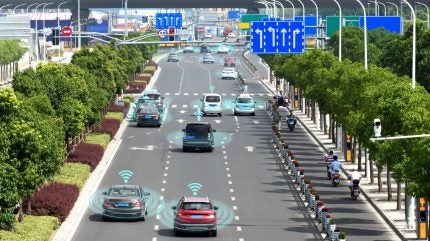
Self-driving vehicles could be on British roads by 2026, after the UK Government’s ‘Automated Vehicles (AV) Act’ became law.
Announced in the King’s Speech, the AV Act enables advanced technology to safely drive vehicles on British roads. The UK Government said the new law ‘puts Great Britain firmly at the forefront of self-driving technology regulation, unlocking the potential of an industry estimated to be worth up to £42 billion and creating 38,000 more skilled jobs by 2035’.
The AV Act follows self-driving trials already taking place across the country. For example, home- Wayve and Oxa are trialling self-driving cars in London and Oxford. This month it was revealed Wayve had secured more than $1 billion in investment to develop its AI technology further in the UK.
A UK Government statement said the law will require self-driving vehicles to ‘achieve a level of safety at least as high as careful and competent human drivers’, as well as meeting rigorous safety checks before being allowed onto roads. Therefore, it said, in the future deaths and injuries from drink driving, speeding, tiredness and inattention could be drastically reduced.
UK Government Transport Secretary, Mark Harper, highlighted the potential safety and economic benefits for the UK. He said: “Britain stands at the threshold of an automotive revolution and this new law is a milestone moment for our self-driving industry, which has the potential to change the way we travel forever.
“While this doesn’t take away people’s ability to choose to drive themselves, our landmark legislation means self-driving vehicles can be rolled out on British roads as soon as 2026, in a real boost to both safety and our economy.”
How well do you really know your competitors?
Access the most comprehensive Company Profiles on the market, powered by GlobalData. Save hours of research. Gain competitive edge.

Thank you!
Your download email will arrive shortly
Not ready to buy yet? Download a free sample
We are confident about the unique quality of our Company Profiles. However, we want you to make the most beneficial decision for your business, so we offer a free sample that you can download by submitting the below form
By GlobalDataThe UK’s automotive trade association, the SMMT, welcomed the new law. Mike Hawes, SMMT Chief Executive, said it was a ‘watershed moment’ for the UK’s auto industry.
“This is a watershed moment for UK automotive innovation and road safety in the UK,” he said. “Self-driving vehicles will revolutionise our society, and this new law will help turn ambition into reality, putting the UK alongside a handful of other global markets that already have their regulatory frameworks in place. The industry will continue its close collaboration with government and other stakeholders to develop the necessary secondary legislation that will enable the safe and responsible commercial rollout of self-driving vehicles and the significant social and economic benefits they will afford the UK.”
Ben Foulser, UK Head of Future Mobility for KPMG, described the new law as a ‘landmark milestone’.
He said the law will accelerate Connected and Automated Mobility (CAM) adoption in the UK, “providing clarity of the roadmap for investors, manufacturers, operators, and the wider public – and cementing the UK as a world leader in the development and deployment of these transformational technologies.”
KPMG estimates that the adoption of CAM could unlock £66bn of annual economic benefits by 2040, through £34bn of real benefits from productivity and efficiency gains, and £32bn of welfare benefits from improvements in safety and sustainability.





